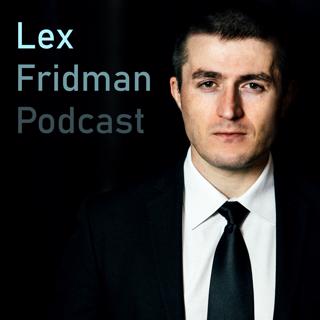
Stephen Kotkin: Stalin, Putin, and the Nature of Power
Stephen Kotkin is a professor of history at Princeton university and one of the great historians of our time, specializing in Russian and Soviet history. He has written many books on Stalin and the Soviet Union including the first 2 of a 3 volume work on Stalin, and he is currently working on volume 3. This conversation is part of the Artificial Intelligence podcast. If you would like to get more information about this podcast go to https://lexfridman.com/ai or connect with @lexfridman on Twitter, LinkedIn, Facebook, Medium, or YouTube where you can watch the video versions of these conversations. If you enjoy the podcast, please rate it 5 stars on Apple Podcasts, follow on Spotify, or support it on Patreon. This episode is presented by Cash App. Download it (App Store, Google Play), use code “LexPodcast”. Episode Links: Stalin (book, vol 1): https://amzn.to/2FjdLF2 Stalin (book, vol 2): https://amzn.to/2tqyjc3 Here’s the outline of the episode. On some podcast players you should be able to click the timestamp to jump to that time. 00:00 – Introduction 03:10 – Do all human beings crave power? 11:29 – Russian people and authoritarian power 15:06 – Putin and the Russian people 23:23 – Corruption in Russia 31:30 – Russia’s future 41:07 – Individuals and institutions 44:42 – Stalin’s rise to power 1:05:20 – What is the ideal political system? 1:21:10 – Questions for Putin 1:29:41 – Questions for Stalin 1:33:25 – Will there always be evil in the world?
3 Tammi 20201h 37min

Donald Knuth: Algorithms, TeX, Life, and The Art of Computer Programming
Donald Knuth is one of the greatest and most impactful computer scientists and mathematicians ever. He is the recipient in 1974 of the Turing Award, considered the Nobel Prize of computing. He is the author of the multi-volume work, the magnum opus, The Art of Computer Programming. He made several key contributions to the rigorous analysis of the computational complexity of algorithms. He popularized asymptotic notation, that we all affectionately know as the big-O notation. He also created the TeX typesetting which most computer scientists, physicists, mathematicians, and scientists and engineers use to write technical papers and make them look beautiful. This conversation is part of the Artificial Intelligence podcast. If you would like to get more information about this podcast go to https://lexfridman.com/ai or connect with @lexfridman on Twitter, LinkedIn, Facebook, Medium, or YouTube where you can watch the video versions of these conversations. If you enjoy the podcast, please rate it 5 stars on Apple Podcasts, follow on Spotify, or support it on Patreon. This episode is presented by Cash App. Download it (App Store, Google Play), use code “LexPodcast”. Episode Links: The Art of Computer Programming (book set) Here’s the outline of the episode. On some podcast players you should be able to click the timestamp to jump to that time. 00:00 – Introduction 03:45 – IBM 650 07:51 – Geeks 12:29 – Alan Turing 14:26 – My life is a convex combination of english and mathematics 24:00 – Japanese arrow puzzle example 25:42 – Neural networks and machine learning 27:59 – The Art of Computer Programming 36:49 – Combinatorics 39:16 – Writing process 42:10 – Are some days harder than others? 48:36 – What’s the “Art” in the Art of Computer Programming 50:21 – Binary (boolean) decision diagram 55:06 – Big-O notation 58:02 – P=NP 1:10:05 – Artificial intelligence 1:13:26 – Ant colonies and human cognition 1:17:11 – God and the Bible 1:24:28 – Reflection on life 1:28:25 – Facing mortality 1:33:40 – TeX and beautiful typography 1:39:23 – How much of the world do we understand? 1:44:17 – Question for God
30 Joulu 20191h 46min

Melanie Mitchell: Concepts, Analogies, Common Sense & Future of AI
Melanie Mitchell is a professor of computer science at Portland State University and an external professor at Santa Fe Institute. She has worked on and written about artificial intelligence from fascinating perspectives including adaptive complex systems, genetic algorithms, and the Copycat cognitive architecture which places the process of analogy making at the core of human cognition. From her doctoral work with her advisors Douglas Hofstadter and John Holland to today, she has contributed a lot of important ideas to the field of AI, including her recent book, simply called Artificial Intelligence: A Guide for Thinking Humans. This conversation is part of the Artificial Intelligence podcast. If you would like to get more information about this podcast go to https://lexfridman.com/ai or connect with @lexfridman on Twitter, LinkedIn, Facebook, Medium, or YouTube where you can watch the video versions of these conversations. If you enjoy the podcast, please rate it 5 stars on Apple Podcasts, follow on Spotify, or support it on Patreon. This episode is presented by Cash App. Download it (App Store, Google Play), use code “LexPodcast”. Episode Links: AI: A Guide for Thinking Humans (book) Here’s the outline of the episode. On some podcast players you should be able to click the timestamp to jump to that time. 00:00 – Introduction 02:33 – The term “artificial intelligence” 06:30 – Line between weak and strong AI 12:46 – Why have people dreamed of creating AI? 15:24 – Complex systems and intelligence 18:38 – Why are we bad at predicting the future with regard to AI? 22:05 – Are fundamental breakthroughs in AI needed? 25:13 – Different AI communities 31:28 – Copycat cognitive architecture 36:51 – Concepts and analogies 55:33 – Deep learning and the formation of concepts 1:09:07 – Autonomous vehicles 1:20:21 – Embodied AI and emotion 1:25:01 – Fear of superintelligent AI 1:36:14 – Good test for intelligence 1:38:09 – What is complexity? 1:43:09 – Santa Fe Institute 1:47:34 – Douglas Hofstadter 1:49:42 – Proudest moment
28 Joulu 20191h 53min

Jim Gates: Supersymmetry, String Theory and Proving Einstein Right
Jim Gates (S James Gates Jr.) is a theoretical physicist and professor at Brown University working on supersymmetry, supergravity, and superstring theory. He served on former President Obama’s Council of Advisors on Science and Technology. He is the co-author of a new book titled Proving Einstein Right about the scientists who set out to prove Einstein’s theory of relativity. This conversation is part of the Artificial Intelligence podcast. If you would like to get more information about this podcast go to https://lexfridman.com/ai or connect with @lexfridman on Twitter, LinkedIn, Facebook, Medium, or YouTube where you can watch the video versions of these conversations. If you enjoy the podcast, please rate it 5 stars on Apple Podcasts, follow on Spotify, or support it on Patreon. This episode is presented by Cash App. Download it (App Store, Google Play), use code “LexPodcast”. Episode Links: Proving Einstein Right (book) Here’s the outline of the episode. On some podcast players you should be able to click the timestamp to jump to that time. 00:00 – Introduction 03:13 – Will we ever venture outside our solar system? 05:16 – When will the first human step foot on Mars? 11:14 – Are we alone in the universe? 13:55 – Most beautiful idea in physics 16:29 – Can the mind be digitized? 21:15 – Does the possibility of superintelligence excite you? 22:25 – Role of dreaming in creativity and mathematical thinking 30:51 – Existential threats 31:46 – Basic particles underlying our universe 41:28 – What is supersymmetry? 52:19 – Adinkra symbols 1:00:24 – String theory 1:07:02 – Proving Einstein right and experimental validation of general relativity 1:19:07 – Richard Feynman 1:22:01 – Barack Obama’s Council of Advisors on Science and Technology 1:30:20 – Exciting problems in physics that are just within our reach 1:31:26 – Mortality
25 Joulu 20191h 35min

Sebastian Thrun: Flying Cars, Autonomous Vehicles, and Education
Sebastian Thrun is one of the greatest roboticists, computer scientists, and educators of our time. He led development of the autonomous vehicles at Stanford that won the 2005 DARPA Grand Challenge and placed second in the 2007 DARPA Urban Challenge. He then led the Google self-driving car program which launched the self-driving revolution. He taught the popular Stanford course on Artificial Intelligence in 2011 which was one of the first MOOCs. That experience led him to co-found Udacity, an online education platform. He is also the CEO of Kitty Hawk, a company working on building flying cars or more technically eVTOLS which stands for electric vertical take-off and landing aircraft. This conversation is part of the Artificial Intelligence podcast. If you would like to get more information about this podcast go to https://lexfridman.com/ai or connect with @lexfridman on Twitter, LinkedIn, Facebook, Medium, or YouTube where you can watch the video versions of these conversations. If you enjoy the podcast, please rate it 5 stars on Apple Podcasts or support it on Patreon. This episode is presented by Cash App. Download it (App Store, Google Play), use code “LexPodcast”. Here’s the outline of the episode. On some podcast players you should be able to click the timestamp to jump to that time. 00:00 – Introduction 03:24 – The Matrix 04:39 – Predicting the future 30+ years ago 06:14 – Machine learning and expert systems 09:18 – How to pick what ideas to work on 11:27 – DARPA Grand Challenges 17:33 – What does it take to be a good leader? 23:44 – Autonomous vehicles 38:42 – Waymo and Tesla Autopilot 42:11 – Self-Driving Car Nanodegree 47:29 – Machine learning 51:10 – AI in medical applications 54:06 – AI-related job loss and education 57:51 – Teaching soft skills 1:00:13 – Kitty Hawk and flying cars 1:08:22 – Love and AI 1:13:12 – Life
21 Joulu 20191h 19min

Michael Stevens: Vsauce
Michael Stevens is the creator of Vsauce, one of the most popular educational YouTube channel in the world, with over 15 million subscribers and over 1.7 billion views. His videos often ask and answer questions that are both profound and entertaining, spanning topics from physics to psychology. As part of his channel he created 3 seasons of Mind Field, a series that explored human behavior. This conversation is part of the Artificial Intelligence podcast. If you would like to get more information about this podcast go to https://lexfridman.com/ai or connect with @lexfridman on Twitter, LinkedIn, Facebook, Medium, or YouTube where you can watch the video versions of these conversations. If you enjoy the podcast, please rate it 5 stars on Apple Podcasts or support it on Patreon. This episode is presented by Cash App. Download it (App Store, Google Play), use code “LexPodcast”. Episode links: Vsauce YouTube: https://www.youtube.com/Vsauce Vsauce Twitter: https://twitter.com/tweetsauce Vsauce Instagram: https://www.instagram.com/electricpants/ Here’s the outline of the episode. On some podcast players you should be able to click the timestamp to jump to that time. 00:00 – Introduction 02:26 – Psychology 03:59 – Consciousness 06:55 – Free will 07:55 – Perception vs reality 09:59 – Simulation 11:32 – Science 16:24 – Flat earth 27:04 – Artificial Intelligence 30:14 – Existential threats 38:03 – Elon Musk and the responsibility of having a large following 43:05 – YouTube algorithm 52:41 – Mortality and the meaning of life
17 Joulu 201958min

Rohit Prasad: Amazon Alexa and Conversational AI
Rohit Prasad is the vice president and head scientist of Amazon Alexa and one of its original creators. This conversation is part of the Artificial Intelligence podcast. If you would like to get more information about this podcast go to https://lexfridman.com/ai or connect with @lexfridman on Twitter, LinkedIn, Facebook, Medium, or YouTube where you can watch the video versions of these conversations. If you enjoy the podcast, please rate it 5 stars on Apple Podcasts or support it on Patreon. This episode is presented by Cash App. Download it (App Store, Google Play), use code “LexPodcast”. The episode is also supported by ZipRecruiter. Try it: http://ziprecruiter.com/lexpod Here’s the outline of the episode. On some podcast players you should be able to click the timestamp to jump to that time. 00:00 – Introduction 04:34 – Her 06:31 – Human-like aspects of smart assistants 08:39 – Test of intelligence 13:04 – Alexa prize 21:35 – What does it take to win the Alexa prize? 27:24 – Embodiment and the essence of Alexa 34:35 – Personality 36:23 – Personalization 38:49 – Alexa’s backstory from her perspective 40:35 – Trust in Human-AI relations 44:00 – Privacy 47:45 – Is Alexa listening? 53:51 – How Alexa started 54:51 – Solving far-field speech recognition and intent understanding 1:11:51 – Alexa main categories of skills 1:13:19 – Conversation intent modeling 1:17:47 – Alexa memory and long-term learning 1:22:50 – Making Alexa sound more natural 1:27:16 – Open problems for Alexa and conversational AI 1:29:26 – Emotion recognition from audio and video 1:30:53 – Deep learning and reasoning 1:36:26 – Future of Alexa 1:41:47 – The big picture of conversational AI
14 Joulu 20191h 46min

Judea Pearl: Causal Reasoning, Counterfactuals, Bayesian Networks, and the Path to AGI
Judea Pearl is a professor at UCLA and a winner of the Turing Award, that’s generally recognized as the Nobel Prize of computing. He is one of the seminal figures in the field of artificial intelligence, computer science, and statistics. He has developed and championed probabilistic approaches to AI, including Bayesian Networks and profound ideas in causality in general. These ideas are important not just for AI, but to our understanding and practice of science. But in the field of AI, the idea of causality, cause and effect, to many, lies at the core of what is currently missing and what must be developed in order to build truly intelligent systems. For this reason, and many others, his work is worth returning to often. This conversation is part of the Artificial Intelligence podcast. If you would like to get more information about this podcast go to https://lexfridman.com/ai or connect with @lexfridman on Twitter, LinkedIn, Facebook, Medium, or YouTube where you can watch the video versions of these conversations. If you enjoy the podcast, please rate it 5 stars on Apple Podcasts or support it on Patreon. This episode is presented by Cash App. Download it (App Store, Google Play), use code “LexPodcast”. Here’s the outline of the episode. On some podcast players you should be able to click the timestamp to jump to that time. 00:00 – Introduction 03:18 – Descartes and analytic geometry 06:25 – Good way to teach math 07:10 – From math to engineering 09:14 – Does God play dice? 10:47 – Free will 11:59 – Probability 22:21 – Machine learning 23:13 – Causal Networks 27:48 – Intelligent systems that reason with causation 29:29 – Do(x) operator 36:57 – Counterfactuals 44:12 – Reasoning by Metaphor 51:15 – Machine learning and causal reasoning 53:28 – Temporal aspect of causation 56:21 – Machine learning (continued) 59:15 – Human-level artificial intelligence 1:04:08 – Consciousness 1:04:31 – Concerns about AGI 1:09:53 – Religion and robotics 1:12:07 – Daniel Pearl 1:19:09 – Advice for students 1:21:00 – Legacy
11 Joulu 20191h 23min


















